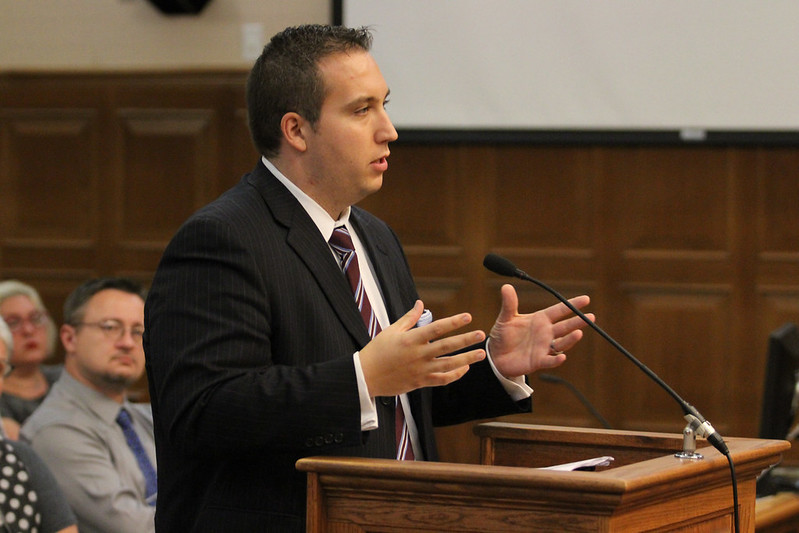
Travis Story, general counsel for a group working to fight the city’s new civil rights ordinance, speaks during a City Council meeting in October 2014.
File photo: Todd Gill, Flyer staff
Opponents of Fayetteville’s Uniform Civil Rights Protection ordinance have lost another battle in an ongoing lawsuit challenging the new law.
Washington County Circuit Judge Doug Martin on Tuesday denied a motion to stay that would’ve prevented the ordinance from taking effect on Saturday, Nov. 7.
The voter-approved measure prohibits business owners and landlords from firing or evicting someone because of their sexual orientation or gender identity. Churches, religious schools and daycare facilities, and religious organizations are exempt from the new law.
Protect Fayetteville, a group that has fought the ordinance since its inception, filed the lawsuit on Aug. 31, the day before early voting began in the Sept. 8 special election.
Judge Martin denied the group’s motion to prevent the public vote, but their complaints in the case still stood.
Travis Story, general counsel for Protect Fayetteville, reiterated those broader arguments in Tuesday’s hearing in an attempt to convince Martin that there was reasonable probability of winning the lawsuit on its merits, which is one test for issuing an injunction.
Story made several arguments, including a claim that the City Council didn’t properly refer the ordinance to voters when it allowed Mayor Lioneld Jordan to cast the sixth vote needed to suspend the council’s rules and move the ordinance to a third and final reading on June 16. Story said Arkansas mayors aren’t allowed to vote unless there is a tie, and since the vote to suspend was 5-3, Jordan’s vote shouldn’t have counted.
Fayetteville City Attorney Kit Williams disagreed and said state law “couldn’t be more clear” on the matter. Citing Arkansas Code Annotated 14-43-501, Williams said mayors may vote “when his or her vote is needed to pass any ordinance, bylaw, resolution, order or motion.”
Story also claimed the ordinance is a violation of a recently passed state law, called the Intrastate Commerce Improvement Act (Act 137), which bans cities and counties from enacting or enforcing “an ordinance, resolution, rule or policy that creates a protected classification or prohibits discrimination on a basis not contained in state law.”
Williams disagreed and cited portions of several state laws, including Title 6, Chapter 18 of Arkansas Code, which prohibits bullying in public schools on the basis of several classes, including sexual orientation and gender identity. Because those protected classes already exist, Williams said, a municipality would not be in violation of Act 137 by adopting nondiscrimination policies based on those classes.
He also said if Act 137 is interpreted to prevent cities from passing anti-discrimination ordinances, it would be a violation of the U.S. Supreme Court’s 1196 Romer v. Evans decision, which concluded that states may not ban protections for LGBT residents.
Finally, Story told Martin he believed the new law would cause “irreparable harm” to anyone who was found guilty of violating the ordinance by exercising their religious right to deny services to a same-sex couple.
Williams also disputed that point and said unless a plaintiff testifies that they intend to violate the law, there is no proof that any irreparable harm will occur, thus failing the second test for issuing a stay.
Martin eventually sided with Williams and said with no proof the law would cause irreparable harm and no convincing argument that the case would be won on its merits, he would rule to deny the motion.
The lawsuit will continue when Williams argues for a motion to dismiss the case on Dec. 1.

